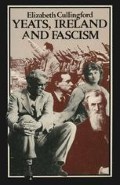Abstract
The last years of Yeats’s political life were marked by two characteristics: isolationism and an individualism which bordered on anarchism. His old age, modelled on the old age of John O’Leary, combined fierce opposition to England with the belief that there are things a man must not do even to save a nation. As if to obliterate the pain of divided loyalties and shattered hopes caused by the Civil War, he returned again and again in his poetry to the heroes of the fight against the British: to O’Leary himself, to Mitchel, Maud Gonne, Parnell, Pearse, Casement, Seumas Connolly, and the O’Rahilly. In the light of later events their cause now seemed marvellously simple, and Yeats celebrated them in the correspondingly unambiguous form of the popular political ballad. Gone were the complexities and qualifications of ‘Easter 1916’, the ironies and self-doubt of ‘Nineteen Hundred and Nineteen’. With the collapse of his faith in all systems of political organization, Yeats fell back on the only stance in which he had ever been tolerably comfortable: O’Leary’s kind of Fenianism. O’Leary’s integrity and moral scrupulousness seemed more than ever necessary in an age where politics had degenerated into ‘so much foul lying’.1 O’Leary’s refusal to admit that the cause might be greater than the man helped Yeats towards his rejection of both fascism and communism, as ideologies which subordinated the citizen to the State or to the Party.
Access this chapter
Tax calculation will be finalised at checkout
Purchases are for personal use only
Preview
Unable to display preview. Download preview PDF.
Copyright information
© 1981 Elizabeth Cullingford
About this chapter
Cite this chapter
Cullingford, E. (1981). An Old Fenian. In: Yeats, Ireland and Fascism. Palgrave Macmillan, London. https://doi.org/10.1007/978-1-349-04546-4_12
Download citation
DOI: https://doi.org/10.1007/978-1-349-04546-4_12
Publisher Name: Palgrave Macmillan, London
Print ISBN: 978-1-349-04548-8
Online ISBN: 978-1-349-04546-4
eBook Packages: Palgrave Literature & Performing Arts CollectionLiterature, Cultural and Media Studies (R0)

